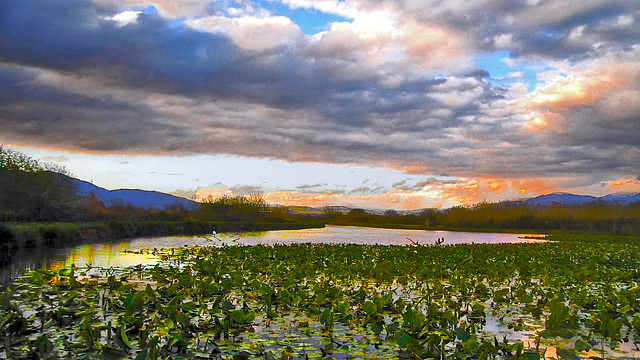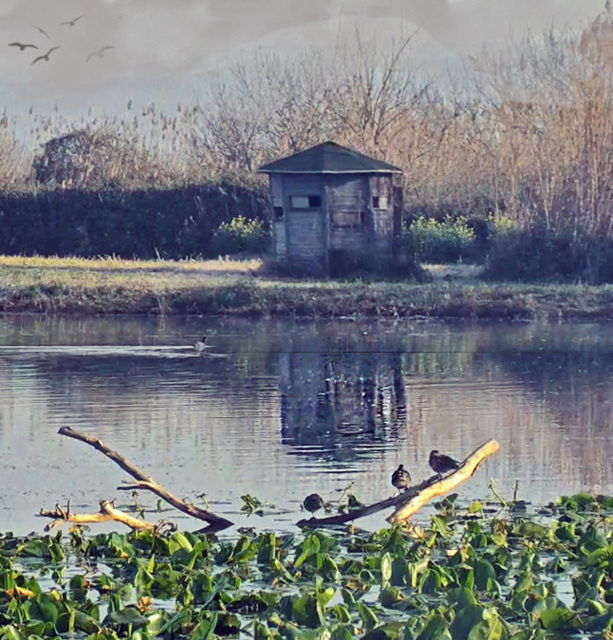
Photos of 24 hour life transmissions
21 Mar 2025
17 favorites
16 comments
World Water Day 2025, Lake Hula, Israel
The valley has been a swampy site throughout recorded history. The H̱ula was a malarial area.. It was left desolate until the 1930s; papyrus and water lilies flourished, and the swamps were inhabited by water buffalo, wild boar, and many species of migratory birds.
. In 1951 the project of draining the H̱ula began, and by 1958 the lake and swamps had disappeared, except for a small section retained as a nature reserve The total land area reclaimed or greatly improved, more than 22 square miles (57 square km), provided some of Israel’s richest farmland. It was planted with grains, fodder crops, fruits (especially apples), peanuts (groundnuts), cotton, vegetables, and bulbs for export. At the northwest of the drained area. By the early 1990s, sinking groundwater levels and other unforeseen environmental consequences of the reclamation project had rendered some farmland unusable and prompted efforts to turn a portion of the H̱ula Valley back into a natural wetland.
In the Hula Valley, which is located on the Syrian-African rift, KKL-JNF has developed an internationally acclaimed bird watching park. Twice a year, no less than five hundred million birds pass through the area, water fowl, birds of prey and songbirds, over 390 species. You can see the birds there, as they migrate from Europe to Africa and back, as well as water buffaloes and wildcats, if you stay overnight, that wake up early for preying. You can also enjoy the lush flora, the unique indigenous fauna and participate in ringing birds.
So as not to upset the ecological balance, private motor vehicles are not allowed in the Hula Lake Park. Entrance is free of charge, and you may walk around for free. You may alternatively enjoy your visit on a bicycle, in a golf cart or on the Mystery Wagon, for a fee. The Mystery Wagon is a camouflaged wagon drawn by a tractor, which allows for maximum proximity to the birds.
About 35,000 cranes arrive in the autumn months, and about 15,000 of them stay for the winter. The multitude of cranes attracts many visitors, and to assist these visitors, KKL-JNF constructed lookouts on a manmade hill at the edge of the lake, which view the field where the cranes feed.
Local farmers, whose fields used to be severely damaged by the birds, worked together with environmental agencies in order to find a way to truly co-exist. The farmers subsequently allocated a portion of their fields to this end, and they now scatter two tons of maize daily in designated locations, during the winter, and the cranes refrain from visiting other fields and cause no more harm.
08 Mar 2025
9 favorites
8 comments
Water buffaloes at lake Hule with 1 PIP
In the 1950s, the goal was to dry the Hula swamps to combat malaria and create much-needed agricultural land. More recently, the need has been recognized to balance this approach with the opportunity to recreate the rich ecosystem that once flourished in the region and to develop eco-tourism and other economic projects appropriate for the twenty-first century.
Before the Hula area was drained, the most notable mammal inhabitant was undoubtedly the herbivorous water buffalo, known by its Arabic name jamus. Historically, the water buffalo were a hallmark feature of this area. The local Bedouin population used the buffalo both for their milk and meat.
KKL-JNF is now reintroducing a breeding stock of buffalo into the area.
From the KKL site.
Jump to top
RSS feed- Latest items - Subscribe to the latest items added to this album
- ipernity © 2007-2025
- Help & Contact
|
Club news
|
About ipernity
|
History |
ipernity Club & Prices |
Guide of good conduct
Donate | Group guidelines | Privacy policy | Terms of use | Statutes | In memoria -
Facebook
Twitter










